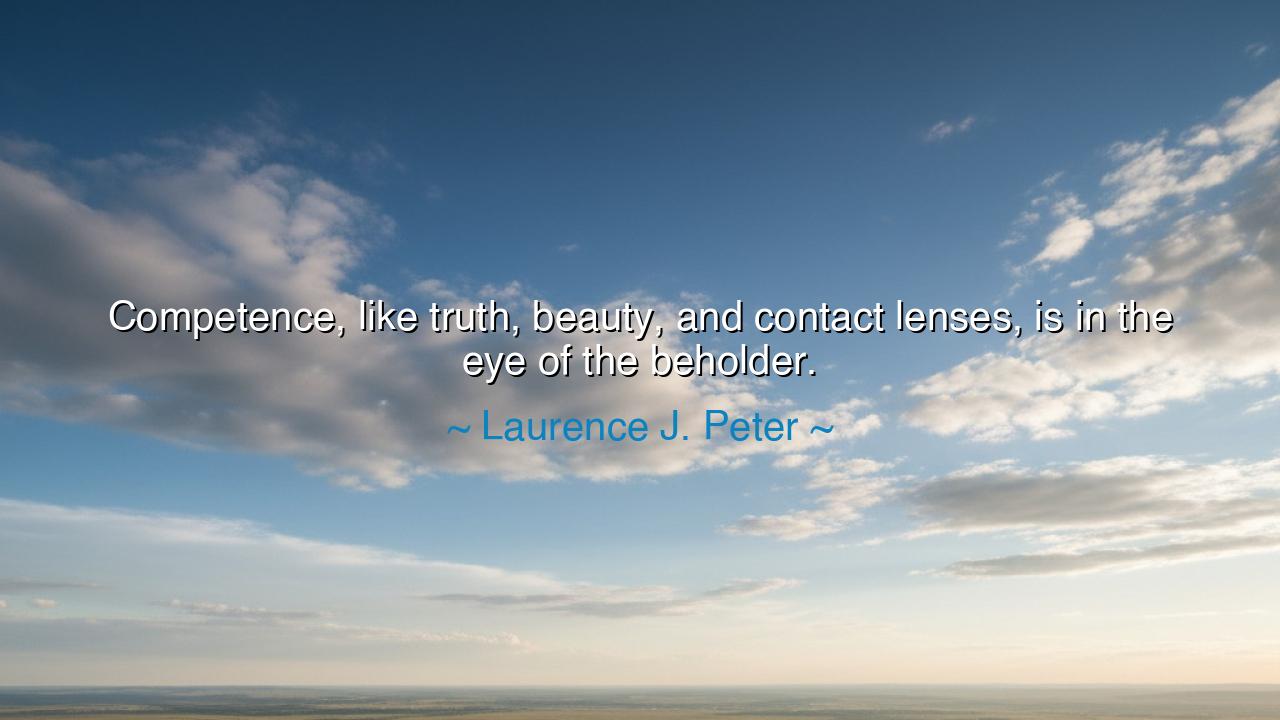
Competence, like truth, beauty, and contact lenses, is in the






Hear the witty yet piercing words of Laurence J. Peter, the sage who unveiled the follies of human systems: “Competence, like truth, beauty, and contact lenses, is in the eye of the beholder.” Though spoken with humor, this saying strikes with the weight of reality. It tells us that competence, the measure of one’s ability, is not an absolute in the eyes of men, but a judgment shaped by perspective, prejudice, and circumstance. What one praises as mastery, another scorns as failure. Thus, like truth and beauty, competence is often less about what is and more about what others see.
The ancients understood this paradox. Socrates, the wisest of Athens, was condemned as a corrupter of youth. His accusers judged his questions as dangerous ignorance, while history remembers them as the highest form of wisdom. His competence in philosophy was invisible to those who feared him, proving that the worth of a man’s skill is not always recognized in his own time. So too does Peter remind us: men do not always judge with clear eyes, but through lenses clouded by expectation and bias.
History is filled with such ironies. Consider Christopher Columbus, hailed by some as a visionary discoverer, condemned by others as reckless and cruel. To the Spanish crown, his competence lay in daring voyages that brought wealth and empire. To his crew, often starving and deceived, he seemed incompetent, risking lives for uncertain gain. And to modern eyes, his legacy is stained with conquest and oppression. One man, three judgments—all dependent on the beholder. Such is the fragile nature of human praise.
Or look to Thomas Edison. To the public, he was the great inventor, a symbol of genius and progress. To Nikola Tesla, he was a thief of ideas, a man whose competence was not brilliance but cunning. Who was right? Perhaps both. For competence is not merely the possession of skill, but the recognition of it, and recognition depends upon those who behold it. Like beauty, it cannot be separated from the eyes that perceive.
Why then does Peter compare competence also to truth? Because even truth, when unadorned, may be rejected if the hearer is unwilling. A man may speak plain reality, yet be dismissed as a fool. Another may cloak falsehood in eloquence, and be hailed as wise. Thus the judgment of competence, like the judgment of truth, often reflects not the speaker but the hearer. And in this lies both danger and humility: we must not take men’s praise or scorn as the final word on our worth.
The lesson is clear: seek competence not for applause but for integrity. Let your work be judged not only by the fickle eyes of men, but by the enduring standards of diligence, honesty, and mastery. If others see it and honor it, be grateful; if they do not, stand firm, knowing that human judgment is flawed. Strive for inner excellence, for in time, the truth of your competence will shine beyond the distortions of perception.
Therefore, let this wisdom be etched upon your soul: competence, truth, and beauty are often hidden in plain sight, revealed only to those with eyes to see. Do not despair if the world misjudges you. Live and labor with integrity, sharpen your craft, and trust that in the fullness of time, reality will outlast perception. For though competence may lie in the eye of the beholder, true excellence—like the sun—cannot remain hidden forever.






TNTam Nhu
Laurence J. Peter’s quote touches on an interesting aspect of competence—it’s fluid and varies from person to person. This makes me wonder: can someone truly be competent if their competence is only recognized by a select few? Or should competence be something more universally acknowledged? How do we reconcile personal perceptions of competence with collective or societal expectations?
HMNguyen Vu Hoang Minh
This quote makes me reflect on how we often define competence based on our own experiences and values. For example, some might think a person is competent based on their achievements, while others might look at their interpersonal skills. It’s interesting how competence, like beauty, can vary from person to person. But is it possible for there to be a baseline or standard for competence, or should it remain entirely subjective?
HTHuyen Tran
I find this comparison between competence and things like beauty and contact lenses interesting. It suggests that what one person considers competent, someone else might not. It also raises the question: is it possible for competence to be universally defined in certain contexts, like in a professional setting? Or is competence always influenced by personal biases and subjective views?
MTMay Tan
This quote really makes me think about how subjective competence can be. What one person sees as a strength, another might view as a weakness. Just like beauty or truth, competence isn't a universal standard—it depends on perspective. But what happens when someone believes they are competent, but others disagree? Can there be a common ground, or is it just always up to individual judgment?